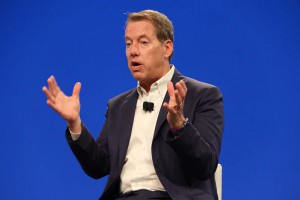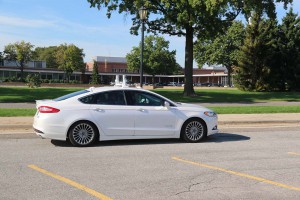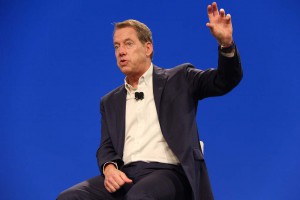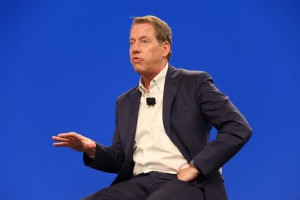When the economy began to melt down in 2008, Ford Motor Co. learned the hard way that the only constant is change. And it’s a lesson Bill Ford, the great-grandson of founder Henry Ford and the carmaker’s current chairman, isn’t about to forget.
It helped to spend 11 years on the board of e-commerce giant eBay, the executive noted during a technology conference at Ford corporate headquarters in Dearborn, Michigan on Tuesday. The event was intended to show how a company long viewed as a ponderous, Rust Belt relic was, in many ways, moving as fast as the oft-heralded start-ups of Silicon Valley.
“Many of the things we’re doing are far afield from a traditional car company,” Ford stressed. We’re disrupting ourselves. But rather than looking at it as scary, it’s a tremendous business opportunity.”
(Click Here to check out what its like to ride in a Ford autonomous Fusion.)
This change in thinking was signaled by CEO Mark Fields who has taken to refer to Ford as a “mobility company,” rather than just a car manufacturing. And Ford has been demonstrating that those are more than just buzzwords with a series of recent actions, such as the announcement last Friday that the Detroit company was buying into San Francisco-based shuttle service Chariot.
That’s one of a variety of different transportation projects Ford is investing in or setting up on its own through its Ford Mobility Initiative. It is exploring not only shuttle but ride-sharing services – including another San Francisco project involving bike sharing. It is exploring ways to provide access to transportation to the hardcore unemployed in American inner cities, and means to deliver food and medical care to the impoverished in places like Gambia and South Africa.
Driving Ford is the recognition that the world of transportation is changing rapidly. On Monday, CEO Fields stressed that, “We believe the next decade will be defined by the development of autonomous vehicles.” Some industry observers believe that the emergence of self-driving cars could lead to a sharp decline in vehicle sales as motorists switch to increasingly affordable car-sharing services.
(Ford will offer driverless tech to retail customers by 2025. For more, Click Here.)
That could be a very real possibility, Fields told the audience gathered for the Further with Ford conference. The challenge is creating a business plan to take advantage of that transition.
In the past, Ford might not have had the corporate culture capable of responding to such a transition – one reason the company’s chairman acknowledged investors are skeptical about giving Ford the sort of stock price multiples granted high-tech firms including new rival Tesla Motors.
And he admitted that the carmaker has to take things slow and cautiously when it comes to making multi-billion dollar bets on things like the aluminum-bodied F-150 pickup launched for 2016, or the move to new turbocharged powertrains. A failure of one of those programs could be devastating. On the other hand, Ford is becoming much more willing to adopt the Silicon Valley model when it comes to some of these mobility ventures. That means being willing to fail and learn from your mistakes.
“We can’t be wed to a model,” Chairman Ford said. “Conversely, we can’t be like a kid in a candy store, grabbing everything that comes along.” The risk is “becoming mesmerized by the panoply of things going on.”
To help spur an environment of change, Ford has set up a growing presence in Silicon Valley. It was important to put roots into that community, the chairman said, and not just pass through like a visitor. But he also stressed that there are plenty of experiments taking place in Detroit and in Ford operations abroad.
While Ford clearly can learn from the high-tech world, it isn’t the proverbial one-way street. The Ford chairman noted that he is often asked to meet and speak to high-tech firms to talk about the concept of corporate culture.
“You don’t acquire a culture. It’s not a mergers and acquisitions thing,” said Ford, noting that maintaining talent is a big problem for Silicon Valley tech companies. Without a clear sense of corporate culture, employees are quick to move to the “next big thing,” or wherever they can get more money.
If Ford is now looking at itself as a mobility company, rather than a carmaker, might it take a lead from one of Silicon Valley’s top players, which changed its name from Apple Computers to Apple? Could Ford Motor Co. become simply Ford? “Hell, no,” the family heir declared. “It’s a heritage, and something I am proud of. I can’t see it (the name) ever changing.”
Ford is by no means the only automaker to try to shift its corporate mindset and become more nimble. General Motors, for example, has been investing in a variety of mobility service companies, including ride-sharing service Lyft. Toyota is experimenting not only with autonomous vehicles but robotic systems that could provide the aged and disabled with new levels of mobility.
Traditionally, said Chairman Ford, his company might have viewed such moves by its competitors with skepticism. He doesn’t dismiss any of those efforts anymore. “We have to bring a learning mindset” to the company,” he said, “not a defensive mindset.
(Click Here to see why Ford has slashed its third-quarter profit outlook.)




